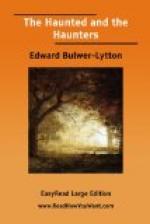I guess your pleasure would abate. ’Tis
well for you, young lady, peradventure, ye see not
with my eyes”—and at the moment,
sure enough, her eyes, which were small, grey, and
in no way remarkable, twinkled with a light so severe
that the effect was unpleasant in the extreme. “’Tis
well for you and them,” she continued, “that
ye cannot count the cost. Time was when hospitality
could be kept in England, and the guest not ruin the
master of the feast—but that’s all
vanished now: pride and poverty—pride
and poverty, young lady, are an ill-matched pair,
Heaven kens!” My tongue, which had at first almost
faltered in its office, now found utterance. By
a kind of instinct, I addressed my strange visitant
in her own manner and humour. “And are we,
then, so much poorer than in days of yore?” were
the words that I spoke. My visitor seemed half
startled at the sound of my voice, as at something
unaccustomed, and went on, rather answering my question
by implication than directly: “’Twas
not all hollowness then,” she exclaimed, ceasing
somewhat her hollow whisper; “the land was then
the lord’s, and that which
seemed, was.
The child, young lady, was not then mortgaged in the
cradle, and, mark ye, the bride, when she kneeled
at the altar, gave not herself up, body and soul, to
be the bondswoman of the Jew, but to be the helpmate
of the spouse.” “The Jew!” I
exclaimed in surprise, for then I understood not the
allusion. “Ay, young lady! the Jew,”
was the rejoinder. “’Tis plain ye know
not who rules. ’Tis all hollow yonder!
all hollow, all hollow! to the very glitter of the
side-board, all false! all false! all hollow!
Away with such make-believe finery!” And here
again the hollow voice rose a little, and the dim
grey eye glistened. “Ye mortgage the very
oaks of your ancestors—I saw the planting
of them; and now ’tis all painting, gilding,
varnishing and veneering. Houses call ye them?
Whited sepulchres, young lady, whited sepulchres.
Trust not all that seems to glisten. Fair though
it seems, ’tis but the product of disease—even
as is the pearl in your hair, young lady, that glitters
in the mirror yonder,—not more specious
than is all,—ay,
all ye have seen
to-night.”
As my strange visitor pronounced these words, I instinctively
turned my gaze to a large old-fashioned mirror that
leaned from the wall of the chamber. ’Twas
but for a moment. But when I again turned my head,
my visitant was no longer there! I heard plainly,
as I turned, the distinct rustle of the silk, as if
she had risen and was leaving the room. I seemed
distinctly to hear this, together with the quick, short,
easy footstep with which females of rank of that period
were taught to glide rather than to walk; this I seemed
to hear, but of what appeared the antique old lady
I saw no more. The suddenness and strangeness
of this event for a moment sent the blood back to
my heart. Could I have found voice, I should,
I think, have screamed, but that was, for a moment,
beyond my power. A few seconds recovered me.
By a sort of impulse I rushed to the door, outside
which I now heard the footsteps of some of the family,
when, to my utter astonishment, I found it was—locked!
I now recollected that I myself locked it before sitting
down.




